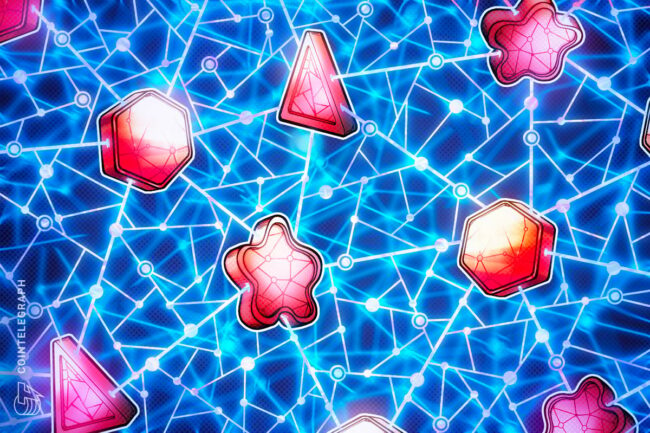
For the most part, nonfungible tokens (NFTs) have two primary use cases: Buying and selling digital products (digital art, virtual fashion items) and building digital communities (exclusive memberships, access to events).
These use cases can be easily adopted by brands and companies, such as fashion brands selling digital clothes, various companies offering NFT-based club memberships and musicians holding exclusive concerts for their fans.
Traditional German companies are also jumping on the bandwagon, recognizing the potential of NFT technology to innovate and market their products and services.
Deutsche Post combines NFTs and AI
Deutsche Post, the German postal service, will release its first limited-edition collectible stamp on Nov. 2, 2023. A classic self-adhesive stamp will come with a digital image — an NFT representing ownership of the stamp.
The first stamp features a pixellated image of the Brandenburg Gate generated by artificial intelligence (AI). Upcoming stamps in the collection will feature other iconic German landmarks.
It remains to be seen whether the NFT stamp collection will be a commercial success. However, it is a significant step for Deutsche Post, which is looking to expand its reach into the digital world.
Erste offizielle Deutschland-#Krypto–#Briefmarke kommt. Mehr: https://t.co/IqcouOeygG pic.twitter.com/XS4y5nkFCo
— Deutsche Post und DHL News (@DeutschePostDHL) October 12, 2023
Lufthansa takes to the skies with NFT art
NFTs can also be used for various loyalty programs, offering customers a more rewarding and engaging experience while providing businesses with a new way to connect with their customers and build brand loyalty.
An example of such a program is Lufthansa’s NFT loyalty program on the Polygon network. In collaboration with Lufthansa Innovation Hub and Miles & More, its frequent flyer program, Lufthansa has developed the Uptrip mobile application that allows passengers to turn their travel experiences into NFTs. These NFTs can then be redeemed for rewards such as mileage bonuses and business lounge vouchers.
Lufthansa’s @Uptrip_app loyalty program is building #onPolygon to turn flights into rewards
Collect NFT trading cards for every flight and claim rewardsLearn more about the new Miles & More and @LHInnovationHub experience: https://t.co/MjQihK8xUx pic.twitter.com/JfUEoUJxNR
— Polygon (Labs) (@0xPolygonLabs) August 31, 2023
According to Christopher Siegloch, head of program development and services at Miles & More, the app has already generated significant interest among Lufthansa customers. Since its launch, over 20,000 users have registered, and more than 200,000 collectible cards have been issued. Siegloch highlights that gamification elements play a crucial role in introducing participants to Web3 technologies like NFTs, and the app successfully translates the enthusiasm for collecting into the digital realm.
Furthermore, in the second half of 2023, the app will introduce a digital marketplace where users can trade and sell their NFTs, with special NFT reward offers planned for the future.
Adidas and Hugo Boss reimagine fashion
NFTs are also reaching out to fashion brands. For example, German apparel company Adidas continues to refine its Web3 strategy by actively using NFTs to find new ways to engage with its community of athletes, sneakerheads and sports enthusiasts.
Recently, Adidas introduced a series of limited-edition NFT sneakers inspired by their iconic footwear designs. These digital sneakers can be showcased in virtual environments, allowing users to express their love for the brand in the metaverse.
Recent: How Google’s AI legal protections can change art and copyright protections
Adidas is also discovering new ways to use the full potential of NFT to encourage its community. The last example is The Adidas /// Studio, or Triple Stripes Studio, which launched a Web3-based digital artist-in-residency program to showcase and support budding creators in the NFT space. According to Adidas, the goal is to support and nurture creative talents in the digital realm, providing artists with an opportunity to showcase their work and collaborate with the sportswear giant. This collaboration extends beyond digital projects and may include physical products in the future.
Another German fashion brand, Hugo Boss, has also entered the NFT arena with a focus on fashion in the metaverse. The company collaborated with renowned digital fashion designers to create a series of exclusive NFT clothing items. These digital fashion pieces can be worn by avatars in virtual worlds, allowing users to dress in style even in the digital realm.
Mercedez-Benz digitalized its history
Mercedes-Benz boasts a rich history spanning more than 130 years, attracting a dedicated following of nostalgia enthusiasts and collectors. The brand’s iconic models, vintage cars and related artifacts, whether in their original form or as miniature models and toys, continue to hold appeal. In line with…
cointelegraph.com
